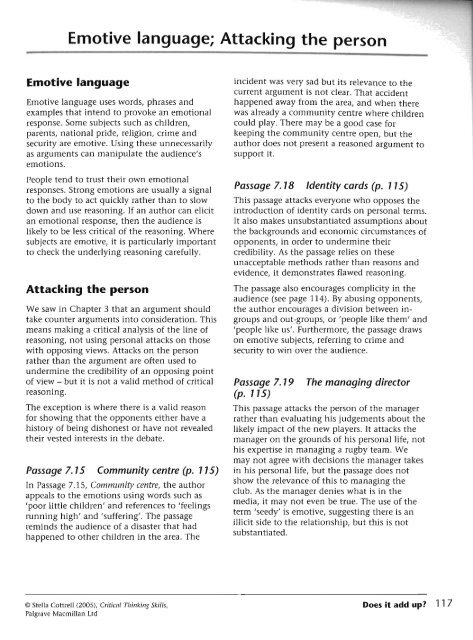Critical Thinking Skills - Developing Effective Analysis and Argument(2)
Critical Thinking Skills - Developing Effective Analysis and Argument(2)
Critical Thinking Skills - Developing Effective Analysis and Argument(2)
Create successful ePaper yourself
Turn your PDF publications into a flip-book with our unique Google optimized e-Paper software.
Emotive language; Attacking the person<br />
Emotive language<br />
Emotive language uses words, phrases <strong>and</strong><br />
examples that intend to provoke an emotional<br />
response. Some subjects such as children,<br />
parents, national pride, religion, crime <strong>and</strong><br />
security are emotive. Using these unnecessarily<br />
as arguments can manipulate the audience's<br />
emotions.<br />
incident was very sad but its relevance to the<br />
current argument is not clear. That accident<br />
happened away from the area, <strong>and</strong> when there<br />
was already a community centre where children<br />
could play. There may be a good case for<br />
keeping the community centre open, but the<br />
author does not present a reasoned argument to<br />
support it.<br />
People tend to trust their own emotional<br />
responses. Strong emotions are usually a signal Passage 7.18 Identity cards (p. 7 15)<br />
to the body to act quickly rather than to sGw This passage attacks everyone who opposes the<br />
down <strong>and</strong> use reasoning. If an author can elicit introduction of identity cards on personal terms.<br />
an emotional response, then the audience is It also makes unsubstantiated assumptions about<br />
likely to be less critical of the reasoning. Where the backgrounds <strong>and</strong> economic circumstances of<br />
subjects are emotive, it is particularly important opponents, in order to undermine their<br />
to check the underlying reasoning carefully. credibility. As the passage relies on these<br />
unacceptable methods rather than reasons <strong>and</strong><br />
evidence, it demonstrates flawed reasoning.<br />
Attacking the person<br />
The passage also encourages complicity in the<br />
audience (see page 114). By abusing opponents,<br />
We saw in Chapter 3 that an argument should the author encourages a division between intake<br />
counter arguments into consideration. This groups <strong>and</strong> out-groups, or 'people like them' <strong>and</strong><br />
means making a critical analysis of the line of 'people like us'. Furthermore, the passage draws<br />
reasoning, not using personal attacks on those on emotive subjects, referring to crime <strong>and</strong><br />
with opposing views. Attacks on the person security to win over the audience.<br />
rather than the argument are often used to<br />
undermine the credibility of an opposing point<br />
of view - but it is not a valid method of critical<br />
reasoning.<br />
Passage 7.79 (P. 7 15)<br />
The managing director<br />
The exception is where there is a valid reason<br />
for showing that the opponents either have a<br />
history of being dishonest or have not revealed<br />
their vested interests in the debate.<br />
Passage 7.15 Community centre (p. 1 15)<br />
In Passage 7.15, Community centre, the author<br />
appeals to the emotions using words such as<br />
'poor little children' <strong>and</strong> references to 'feelings<br />
running high' <strong>and</strong> 'suffering'. The passage<br />
reminds the audience of a disaster that had<br />
happened to other children in the area. The<br />
This passage attacks the person of the manager<br />
rather than evaluating his judgements about the<br />
likely impact of the new players. It attacks the<br />
manager on the grounds of his personal life, not<br />
his expertise in managing a rugby team. We<br />
may not agree with decisions the manager takes<br />
in his personal life, but the passage does not<br />
show the relevance of this to managing the<br />
club. As the manager denies what is in the<br />
media, it may not even be true. The use of the<br />
term 'seedy' is emotive, suggesting there is an<br />
illicit side to the relationship, but this is not<br />
substantiated.<br />
O Stella Cottrell (2005), <strong>Critical</strong> Tlzinkii~g <strong>Skills</strong>,<br />
Palgrave Macmillan Ltd<br />
Does it add up 1 1 7



